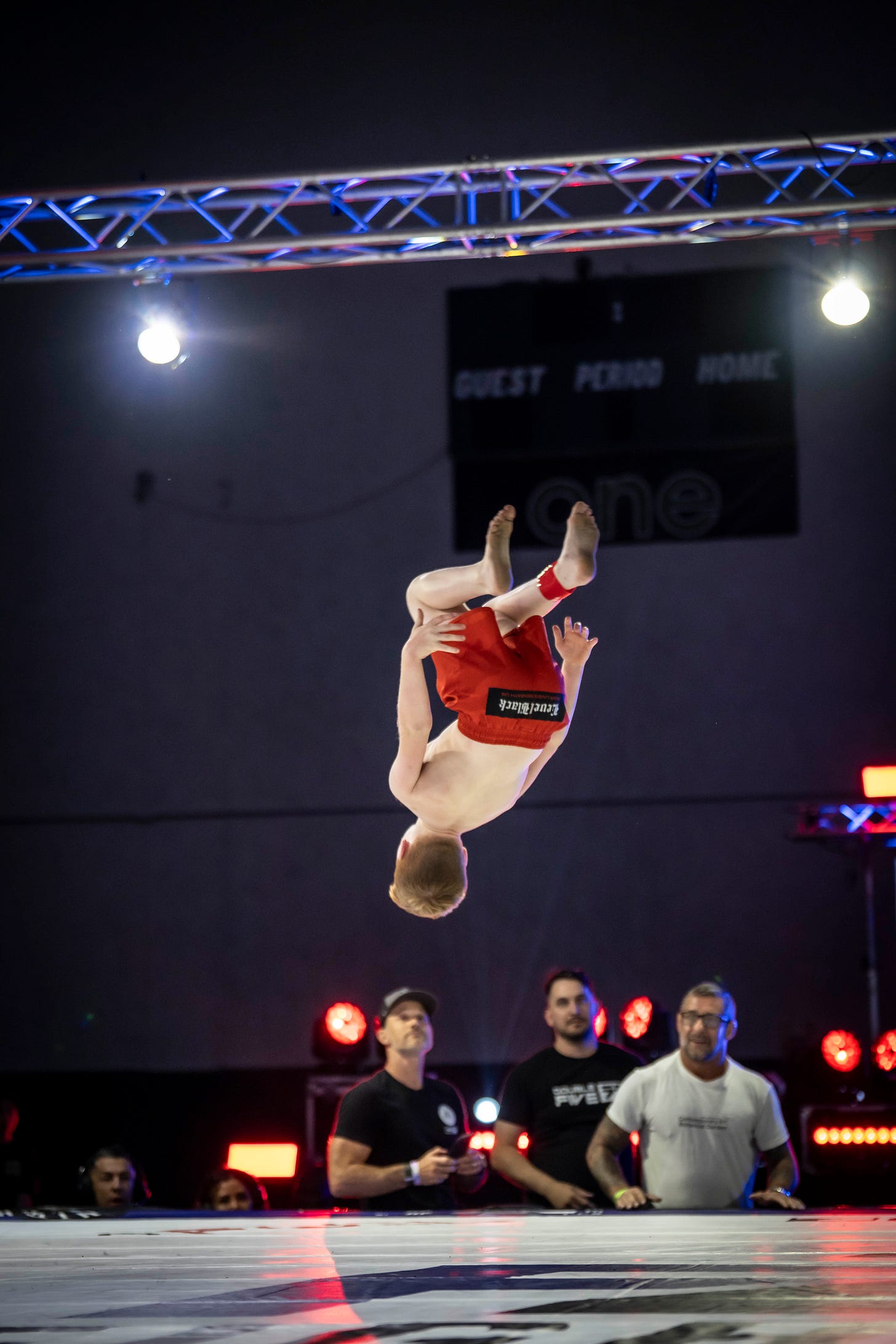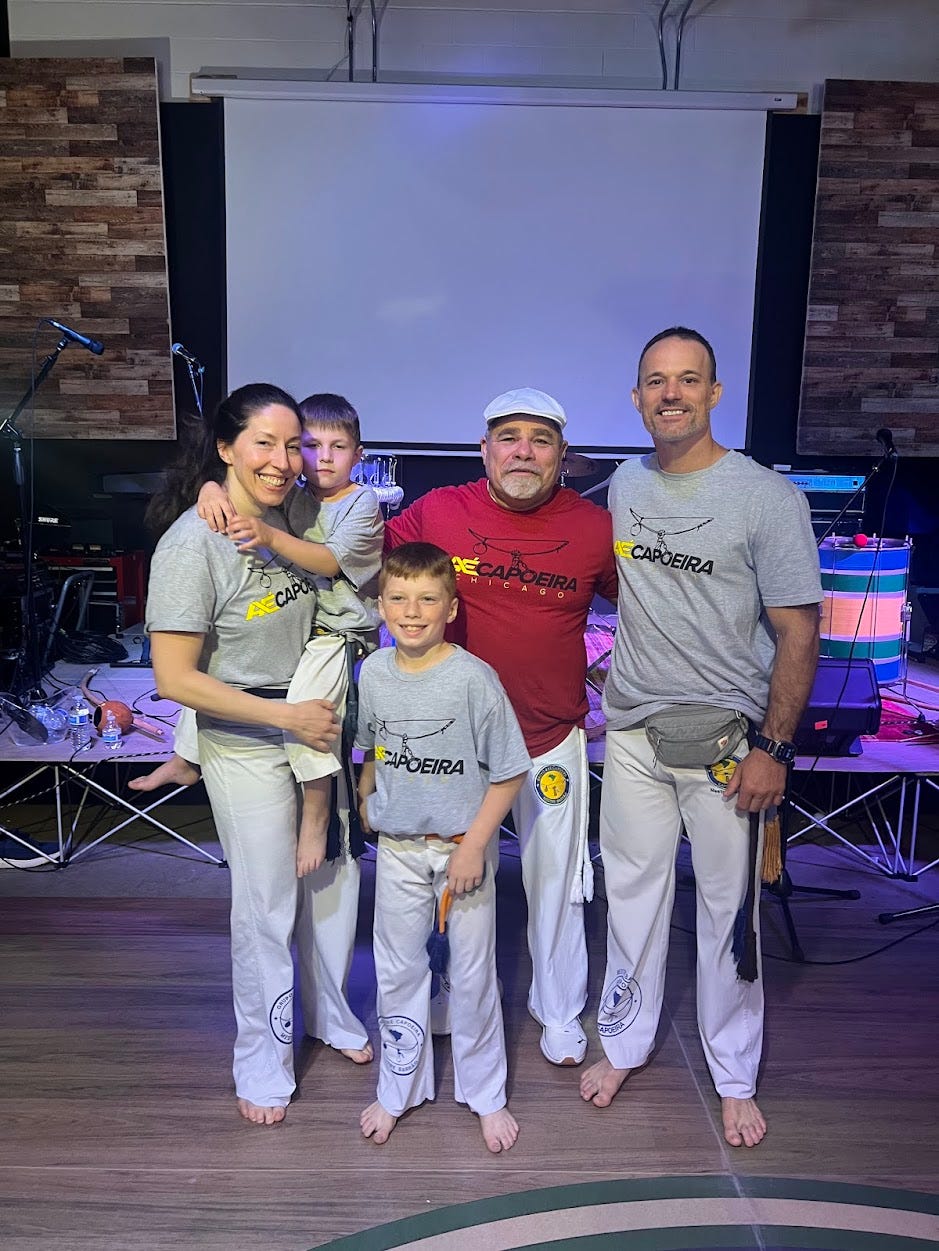🔥Welcome to Volume #00121!🔥
I’m Christian Champ. This is ☯️The Middle Way Newsletter ☯️. It is a place where I write, explore, share, and invite you along for the journey.
If you enjoy the newsletter, please share it with your friends.
📜When the Traditional Script Fails, Write Your Own📜
How We Launched the Largest Venture at Home
“I’m bored and I don’t want to go to school.”
The first time you hear it, you shrug it off. The second time, the same. When it becomes a daily occurrence, alarm bells ring.
I always hated school. I loved seeing friends, playing sports, and reading books. I loved it when a topic was introduced, and then I could dive in on my own by exploring, experimenting, and figuring it out.
What I hated was sitting around and being bored. School was too slow. Too passive. I wanted to be moving, questioning, trying things, learning by doing, not memorizing what someone wanted to feed the group, or worse, what I already knew.
Even today, I can’t sit through boring lectures. I need to move while listening, or read instead of listening. I need to ask questions and engage in dialogue to stay engaged, but that doesn’t always work in a room full of people.
When I read comparisons between school and prison, they resonate. I wanted to learn, but on my terms, not locked to a chair and told to be quiet.
Years later, when my oldest hit second grade, he started echoing those exact words: “I’m bored. I don’t want to go to school.” Immediately, all my old feelings surfaced.
He wanted harder math problems. He didn’t want to sit in Spanish when he already spoke the language. He wanted to choose projects, chase curiosity, and drop things when they lost their spark.
His current teacher pushed back. Even in a Montessori classroom, the response was: sit still, follow along. His previous teacher already confirmed he wasn’t being challenged.
Then came the breaking point. A school administrator pulled our son out of class to interrogate him about why he’d want to leave “the best school in the world” and then lied about having the conversation. That sealed it for us.
We launched Champ Academy—our venture into personalized learning for our kids.
The premise was simple: kids agreed to do the work, and in return, they earned the freedom of self-directed learning. The aim wasn’t to recreate school, but to raise lifelong learners by blending structure and freedom, mastery and curiosity.
Every day needed to hit four anchors: reading, writing, math, and movement. Once those were in place, the rest became an open canvas. My role is to set conditions for growth, make adjustments as needed, coach, and provide guidance when necessary.
Like any launch, there were many unknowns. The only way forward was to try, fail, adjust, and try again. Success meant they learned how to learn. Failure meant we’d course-correct and design a new path.
And like all worthwhile endeavors, we found both. Some things came easier than expected, others harder—primarily for me, not them.
Conventional learning accelerated. With no artificial pacing, progress was limited only by their ability and interest. Our six-year-old finished the year doing third-grade math and reading books his brother had read the year before. Our “third grader” advanced to fifth-grade math, which he wrapped up this week as we kicked off year two.
We added storytelling, group discussions, and strategy games. History came from books, YouTube explainers, and podcasts. Movement meant capoeira, BJJ, wrestling, gymnastics, acrobatics, soccer, skateboarding, basketball, parkour, football and breakdancing. Daily practice in the home gym tied it together.

The most common questions we hear are: How do they socialize? and Do you follow a curriculum?
The answer to the first is obvious: they socialize constantly. They do everything we do. From the time they were four, they were training handstands, capoeira, wrestling, BJJ, and always learning alongside grown-ups.
The second one is yes, but we stay flexible. If it works, we double down. If it doesn’t, we shelve it and move on. We don’t follow a fixed script beyond everyday essentials of movement, math, writing, and reading. The rest is micro-experiments fueled by curiosity.
The questions we keep asking are simple: How do we keep learning, growing, and staying curious? How do we raise good humans who make things better?
That’s the heart of it. That’s our startup. And when the traditional script fails, we don’t wait for someone else to fix it—we write our own.
🧠Things to Think About🧠
The Math Academy Way Working Draft Book
Math Academy is one of the resources we use for structuring Champ Academy. Beyond liking and using their math product, this living book is an excellent resource for ideas around learning and talent development.
A couple of my favorite ideas from the work:
In talent development, instruction is completely individualized, where to increase skill, you need a sufficient level of mastery to move on.
Accountability and incentives are necessary but absent in education (why grades can’t be trusted).
Our limits exist, but are higher than we think.
We always strive for active learning and deliberate practice, which require effort and discomfort.
Use gamification and effort to develop talent.
KC writes about how The Best Coaches Know When to Stop Talking
Here are some things I’ve learned to do when coaching:
-Resist the urge to fill silence with explanation- Trust that struggle is part of the learning process
-Ask guiding questions instead of giving ready-made answers
-Step in only when correction is truly necessary
-Instead of correcting step by step, give further context of the position and remind them of the priorities from there. This will guide them to make better decisions moving forward
Review of Alpha School for Astral Codex
Alpha School helps kids 2 to 4x+ their learning by setting no boundaries and allowing everyone to work at their own pace. We use some of their methods for Champ Academy.
The piece breaks down what it is like for kids to attend Alpha and why they think it works.
2-Hour Learning’s flagship school is the “Alpha School” in Austin Texas. The Alpha homepage makes three claims:
Love School
Learn 2X in two-hours per day
Learn Life Skills
Only the second claim seems to be controversial, which may be exactly why that is the claim the Alpha PR team focuses on. That PR campaign makes three more sub-claims on what the two-hour, 2x learning really means:
“Learn 2.6X faster.” (on average)
“Only two hours of academics per day.”
“Powered by AI (not teachers).”
The author’s kids, according to her calculations, are learning at 3x speed, but view Alpha a bit more as…
It isn’t genuine two‑hour learning: most kids start school at 8:30am, start working on the “two-hour platform” sometime between 9am-930am and are occupied with academics until noon-1230pm. They also blend in “surges” from time to time to squeeze in more hours on the platform.
It isn’t AI in the way we have been thinking about it since the “Attention is all you need” paper. There is no “generative AI” powered by OpenAI, Gemini or Claude in the platform the kids use – it is closer to “turbocharged spreadsheet checklist with a spaced‑repetition algorithm”
It definitely isn’t teacher‑free: Teachers have been rebranded “guides”, and while their workload is different than a traditional school, they are very important – and both the quantity and quality are much higher than traditional schools.
The bundle matters: it’s not just the learning platform on its own. A big part of the product’s success is how the school has set up student incentives and the culture they have built to make everything work together
The author believes it works (their kids are proof of work) and notes that it took roughly 3.5 hours to get in those 2 hours of learning.
1:1 learning: It’s not really 1:1, but in practice every kids is working on stuff at the edge of their ability, rather than the median of a group
Spaced Repetition: The system brings back topics on a regular basis “just before” the student forgets, so it is more likely to encode in long term memory
Mastery: In most education settings school students learn some percentage of the material and then move on. This can work for a while, but eventually students who missed something will struggle because they don’t have the tools to learn the next thing on the ladder. This is particularly noticeable in mathematics, but it can be a problem anywhere. With “mastery learning” the kids are not allowed to move on without mastering the subject. If there is something they miss, the system will bring it back again and again until they have mastered it. Liemandt in particular thinks this is a very big deal, and believes it is a significant driver of Alpha’s success (and the reason many kids are failing in traditional schools)
The afternoon is workshop time or check chart time. This includes sports, entrepreneurship (running an Airbnb), Chess, competitive debate, competitive speech, robotics and a list of other real life activities.
The goal of the activities is a measurable and legible outcome.
The check chart time is making a list of things kids want to do like giving a Ted Talk to 30 people or taking 10% off their mile run PR.
The check chart provides two benefits:
It gives the kids autonomy. Every week they have time where they can choose what to do with it. They decide which check items they want to work on next
It gives the kids goals beyond the academic platform, and shows that they don’t advance “automatically” based on just “aging up”. If their friend moves up before they do, they need to double down so they can catch up.
The other key ingredient used by Alpha School is Charlie Munger’s favorite thing to focus on, incentives. The school supercharges performance by rewarding kids with Alpha bucks. They use the same method that inspires the workforce, monetary rewards.
If the students complete their 2-hour learning “minimums” each day they earn about 10 GT Bucks. They get additional bonuses for every lesson they complete beyond their minimums. They also get a bonus if they finish their minimums within the scheduled time (vs going home and doing them later), additional bonuses if the entire class completes their minimums during the allotted time, and weekly bonuses for hitting longer term targets.
They only get credit if they both complete their lessons AND get 80% or higher on the problem sets within the lesson. If they get 79% they still move on (with the questions they missed coming back later for review), but they don’t get the GT bucks associated with the lesson (this stops gaming where the kids rush through the lessons just to get “bucks”)
A GT buck is worth 10-cents. So if they are really pushing a kid could be earning roughly $2 per day.
Fryer paid kids to read books, GT pays kids to do lessons.
Once a kid has earned a collection of GT bucks they can spend those bucks at the GT-store. The Alpha store has a wide selection of offerings. The GT store, because it is a much smaller school, is more like a catalog. The kids can select what they want and the school will order it so it is ready when they earn enough “bucks”. Every kid has their own personalized incentive – do the school work and they will get their personalized prize.
🎧Things to Listen, See, and Watch 🎧
Invest Like The Best Talks to Joe Liemandt on Alpha School
Alpha School rebuilds school from first principles: kids must love school, learn far faster, and gain life skills.
For K-8, they use a structured life skills curriculum managed by guides and coaches.
High schoolers transition to self-directed learning, working on passion projects with resources like AI.
High schoolers receive feedback from the market and public instead of relying on teachers, by reaching out to adults and engaging online.
Alpha hires diverse high-caliber staff (coaches, ex-athletes) and pays significantly above market to attract talent.
At Alpha School, adults are ‘guides’ or ‘coaches’ instead of academic teachers; their primary role is to fulfill three commitments to students: love school, learn 2X, and learn life skills.
Guides are assessed by whether they transform students’ lives, similar to how impactful teachers do.
The reason a teacher transforms your life is not because of grading quizzes, but because they motivated and understood you.
Good teachers provide high support and hold high standards, motivating students to believe in their potential.
Alpha School’s guides follow Dr. Yeager’s philosophy from the book ‘10 to 25, How to Motivate’.
Present progress with simple, gamified daily goals and rings so students track mastery instantly.
Lock privileges (afternoon activities) behind academic rings to align incentives with learning.
Liemandt bet his daughter $1,000 to reach top 1%, and she used the incentive to vastly increase effort and confidence.
The reward changed her self-image from ‘not as smart’ to ‘I can do anything.’
Ed Latimore on the Jim Rutt Show
Ed grew up in the rough housing projects in the Hill District in Pittsburgh (where I used to play in a summer basketball league in middle school).
Moving to a high-performing high school changed his trajectory and led him to go to college.
The freedom of college undid him, as he lost the environmental cocoon of his friends and their family members from the high-performing high school, who helped shepherd and buffer him from old habits.
He believes all men should compete in a combat sport, which includes sparring.
Rutt noted that when he grew up, learning to fight was a key part of childhood.
Boxing gave Ed a purpose after failing out of college and built discipline.
Tutoring kids in math became a big life unlock, creating meaning and self worth and a path to bigger things.
Ed’s tweet sums up his life experiences
One cool thing about being a late bloomer in life is that you learn to appreciate the power of time. Bad things happen quickly. Good things tend to take a while. When you understand this, you feel confident when something takes time to develop. In fact, you come to completely distrust anything that comes quickly and easily.
💣Words of Wisdom💣
“But, ironically (and embarrassingly), it would be difficult to design an educational model that is more at odds with the findings of current research about human cognition than the one being used today at most colleges and universities.” (The Math Academy Way)
“To elevate a moment, do three things: First, boost sensory appeal. Second, raise the stakes. Third, break the script.” (Chip Heath and Dan Heath, The Power of Moments)
“The fact is that this is what society is and always has been: a symbolic action system, a structure of statuses and roles, customs and rules for behavior, designed to serve as a vehicle for earthly heroism.” (Ernest Becker, The Denial of Death)
“The safest investment is the thing you have the most control over: yourself.” (Bryan Franklin, Michael Ellsberg, The Last Safe Investment)
“Learn to deal with the valleys, because the hills will take care of themselves,” he said. The hills are a metaphor for success. The valleys are a metaphor for when you have to pay your dues and get your butt kicked.” (Quincy Jones, 12 Notes)
“Find a group of people who challenge and inspire you, spend a lot of time with them, and it will change your life.” (Amy Poehler)
“But truth, like reality, is an encounter, It is in the nature of an encounter that more than one element is involved.” (Iain McGilchrist, The Matter With Things)
“The path to becoming an elite mover is not through building up the brain’s information processing power because such processing is unnecessary. The path to becoming elite comes from tuning into these powerful, direct information sources.” (Rob Gray, Learning to Optimize Movement)
“My father used to say, “The new comes out of the random.” Mutual learning happens in the entropy; we need the confusion to release the new. This dance exists everywhere in nature.” (Nora Bateson, Small Arcs of Larger Circles)
🙏Thanks for Reading🙏
What scripts do we need to rewrite? How can we initiate this process?
Namaste,
Christian












